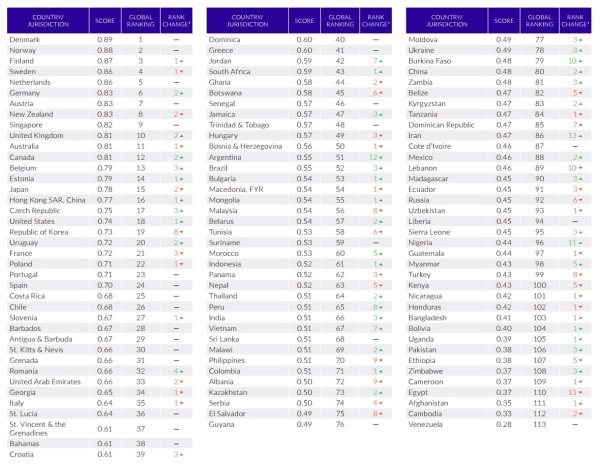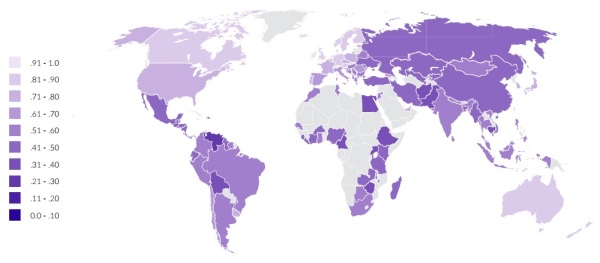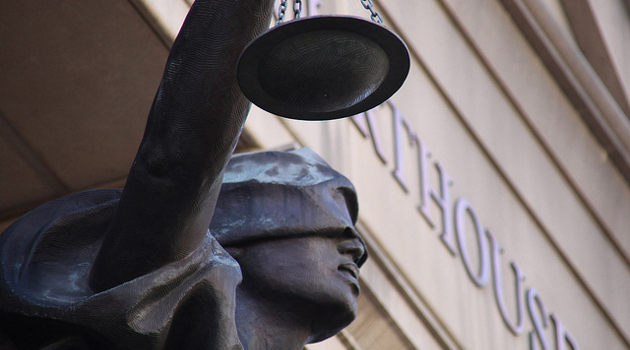The great contribution of western civilization is the notion that the power of government must be constrained by laws.
This doesn’t mean that all laws (or even most laws) are good. But, as explained in this video, if the choice is between the “rule of man” (the arbitrary and capricious exercise of power) and the “rule of law,” there’s no contest.
This is why issues related to the rule of law account for 20 percent of a nation’s grade in the rankings from Economic Freedom of the World.
And it’s why some people get very upset when, for instance, the Obama Administration chooses to unilaterally change – or simply chooses to not enforce – certain laws that are inconvenient to the President’s agenda.
But while the rule of law has been eroding in the United States, the good news is that we still rank in the top 20 in a new ranking from the World Justice Project.

Here’s how the WJP describes the importance of the rule of law.
Effective rule of law reduces corruption, combats poverty and disease, and protects people from injustices large and small. It is the foundation for communities of peace, opportunity, and equity – underpinning development, accountable government, and respect for fundamental rights. …The Index is the world’s most comprehensive data set of its kind and the only to rely solely on primary data, measuring a nation’s adherence to the rule of law from the perspective of how ordinary people experience it. These features make the Index a powerful tool that can help identify strengths and weaknesses in each country, and help to inform policy debates, both within and across countries, that advance the rule of law
And here’s a map showing the 113 nations that are included in the rankings.
All you need to know is that it’s good to be light-colored and bad to be dark-colored (though the map is a bit confusing since nations that aren’t ranked – much of Africa, for instance – also appear as light-colored).

One of the obvious conclusions is that the western world (Europe, North America, some nations in the Pacific Rim) does the best on protecting, observing, and maintaining the rule of law.
Simply stated, western civilization is superior.
 But what can we learn by specifically examining the rule of law in developed nations?
But what can we learn by specifically examining the rule of law in developed nations?
What’s immediately apparent, if you look at the ranking of high-income nations, is that Nordic nations score very well. This is one of the reasons,I’ve explained, that they have a higher ability to tolerate and endure a large welfare state.
Germanic and Anglo-Saxon nations win the proverbial silver and bronze medals.
Looking at the rest of the world, I’m also not surprised to see strong scores for free-market success stories such asSingapore, Estonia, Hong Kong, andChile.
Let’s close by taking a closer look at the data for the United States.
Among high-income nations, America gets a decent score, but it’s nothing to celebrate. Indeed, we actually do poorly when compared to other Anglo-Saxon jurisdictions.
In the above excerpt, I included the list of eight categories that are used to rank nations. Now let’s look at how America scores in those areas.
At the risk of oversimplifying, we do well in two areas. There are reasonably strong constraints on government powers and a reasonable degree of openness and transparency.
On the other hand, we don’t do very well (particularly when compared to other high-income nations) for areas related to the judicial system.

Though I shudder to contemplate the scores America will receive after four or eight years of Hillary Clinton.
P.S. Is anybody surprised that Venezuela is in last place? Though I suppose I should repeat my caveat from earlier in the month that hellholes such as Cuba and North Korea would probably rank lower if they were included in the rankings.
———
Image credit: Tim Evanson | CC BY-SA 2.0.

